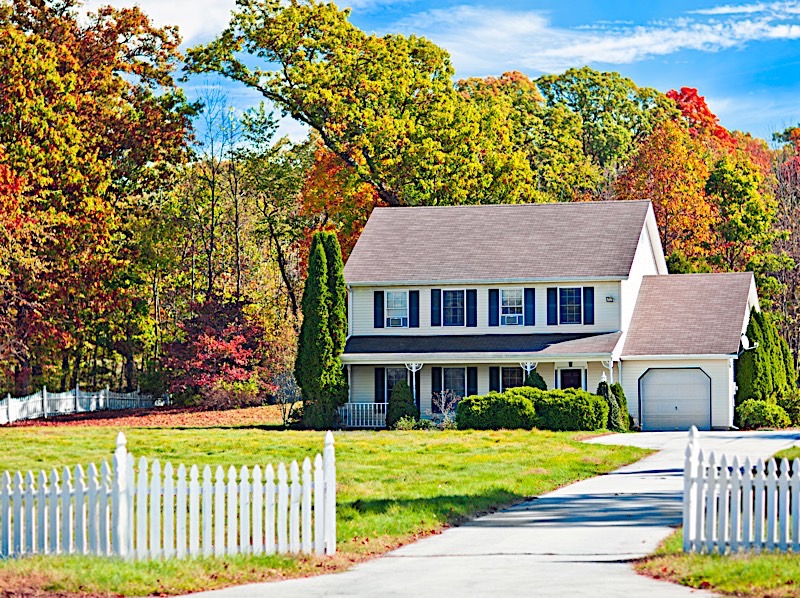Tips For Buying A House This Fall
By Than Merrill
While the fall real estate market undoubtedly represents the beginning of the end of the busiest time of the year for the housing sector, it’s nevertheless a great time to buy a home. Despite the tempered expectations levied on the season as a whole, buyers may find themselves the beneficiaries of some unique advantages that were otherwise unavailable over the course of summer. In fact, those that buy a house in fall may find it to be the best time to purchase a home if the appropriate steps are taken.
The Benefits Of The Fall Real Estate Market
Those that buy a house in fall may realize some or all of the following benefits:
- Less Competition
- Great Deals
- Motivated Sellers
- Tax Credits
- More Attention
[ Wondering how to fund your first investment deal? Click here to register for a FREE real estate class where you will learn how to get started in real estate investing, even with limited funds. ]

Less Competition
Fall typically represents the beginning of the real estate industry’s off season. That’s not to say the housing market closes down when the temperature starts to drop, but rather that this time of the year tends to coincide with a noticeable drop in activity. Evident decreases in transaction rates will occur, but they are more the result of weather than anything else—the market itself will remain alive and well.
Despite unanimously tempered expectations, there are still plenty of homes for sale, which spells great news for prospective buyers. Not surprisingly, it is at this time of the year when competition drops off. Whether other buyers are less inclined to shop because of frigid temperatures or they already purchased a home over summer, fall represents a great time to look for a new home as there are far fewer buyers to compete with.
Great Deals
Homebuying competition tends to decrease when the summer real estate frenzy ends and the fall market takes hold. Not only did most people that wanted to buy already do so, but the weather will quite literally make it more difficult for some parts of the country to even house hunt. As a result, demand lowers, effectively tilting the scales in favor of buyers. If for nothing else, the laws of supply and demand dictate that lower demand will almost always result in a lower price point.
More specifically, it’s around this time of the year that buyers tend to stop competing with other buyers; homeowners actually start competing for the attention of prospective buyers. A major reversal takes place—one that typically witnesses owners reducing prices in order to attract buyers.
Motivated Sellers
While less competition and drops in prices represent a great opportunity for homebuyers, the greatest benefit that has become synonymous with the fall real estate market is perhaps the seller’s motivation.
In the event the home has been on the market since summer, there’s a great chance the seller’s own motivation to part ways with the property has increased dramatically. It’s only fair to assume homes that were unable to sell over the course of summer must reevaluate their position; namely the price point they last settled on.
There is no reason to believe a home that doesn’t sell in summer won’t need to drop its price point to attract buyers.
Tax Credits
Owning a home boasts incredible tax benefits. Real estate has proven to serve as an incredible tax shelter for those that know the appropriate deductions to make. For those looking to purchase homes in fall, it’s important to note that it’s not too late to be able to claim popular deductions like property tax and mortgage interest. In fact, those that buy over this period may be in line for tax benefits spanning the entire year. In the event you are hoping to realize a more attractive tax season, buying a home in the fall can still net you some impressive deductions.
“Property tax and mortgage interest are both deductions you can take for your whole year’s worth of income, even if you closed on your home in December,” says David Hryck, a New York, NY tax adviser, lawyer, and personal finance expert. “Any payments that are made prior to the closing of the loan are tax-deductible. This can make a serious difference in the amount you owe the government at the end of the year.”
More Attention
The lull in activity usually experienced around fall could translate into more attention for buyers. As already mentioned, sellers will start to compete over buyers as demand starts to dip, but there’s one more group of people today’s buyers will benefit from receiving more attention from: Realtors and real estate agents.
Whereas most agents will find themselves with several clients over the busier spring and summer months, it’s likely their business will begin to slow in conjunction with the fall market. That means the majority of real estate agents won’t be forced to work with more clients than they can handle at a single time, and can dedicate more resources to those in need of their assistance. Without having to juggle too many clients, agents can dedicate more of their time to a single buyer, which could result in huge savings of time and money.
Quick Tips For Buying A House In The Fall
- Be Prepared To Negotiate: Despite inventory levels having a tendency to decline over the fall real estate market, buyers may often find themselves with plenty of leverage. At the very least, most buyers tend to abandon their home buying plans when the weather cools down. As a result, supply and demand swings in favor of buyers, which provides them with all the leverage they need to lead negotiations. Aside from negotiating a better deal, buyers may be able to secure better loan terms and underwriting. Don’t be afraid to negotiate more than usual, as there will be several indicators working in your favor.
- Don’t Apply Broad Generalizations: While the fall real estate market has a history of tempering expectations, the truth is that real estate is highly localized. More importantly, each market is different and may reflect unique indicators for its particular area. That said, it’s not safe to assume the area you are shopping in follows the same rules as the national market. You must mind due diligence and confirm that the same rules I have talked about here apply to your own area. Be sure to study your own market and make sure it exhibits the telltale signs of a fall market before using this advice.
- Bring Cash To The Table: While not only a useful tactic in the fall, using cash to complete a transaction is almost always a good idea. There are even some instances where using cash may land you a better deal on the property, as sellers tend to like the idea of not having to go through a third-party lender. Cash also means the buyer has secured funding, and isn’t at risk of losing access to the money at the closing table. Cash buyers are less of a risk to sellers, which could result in landing the deal at an even better price.
- Pay Close Attention To Weather Related Issues: Poor weather has a tendency to bring out the worst in a property, whether it’s a leaky roof or a broken HVAC unit. Cold weather, in particular, can really take a toll on a property, so be sure to mind due diligence when vetting homes. Pay attention to how the home deals with current weather conditions and make sure any snowfall isn’t covering up potential issues. In areas known to accumulate a lot of snow, it will pay to mind due diligence. Check to make sure everything is in order, from the yard to the roof. Doing so could save you a lot of money on repairs down the road.
Summary
Those looking to buy a house in fall shouldn’t let the idea of a “slower” real estate market influence their decision. If history has taught us anything, fall is actually a great time to buy a home. Despite a lack of activity, buyers are made privy to several advantages, not the least of which include less competition, lower prices, and increased motivation on behalf of the seller. All things considered, fall may be one of the best times of the year to buy a house.
Key Takeaways
- When is the best time to buy a house, if not for when there is less competition?
- The fall real estate market is attractive to buyers for several reasons.
- Those that buy a house in fall may find themselves the beneficiaries of less competition and better prices.